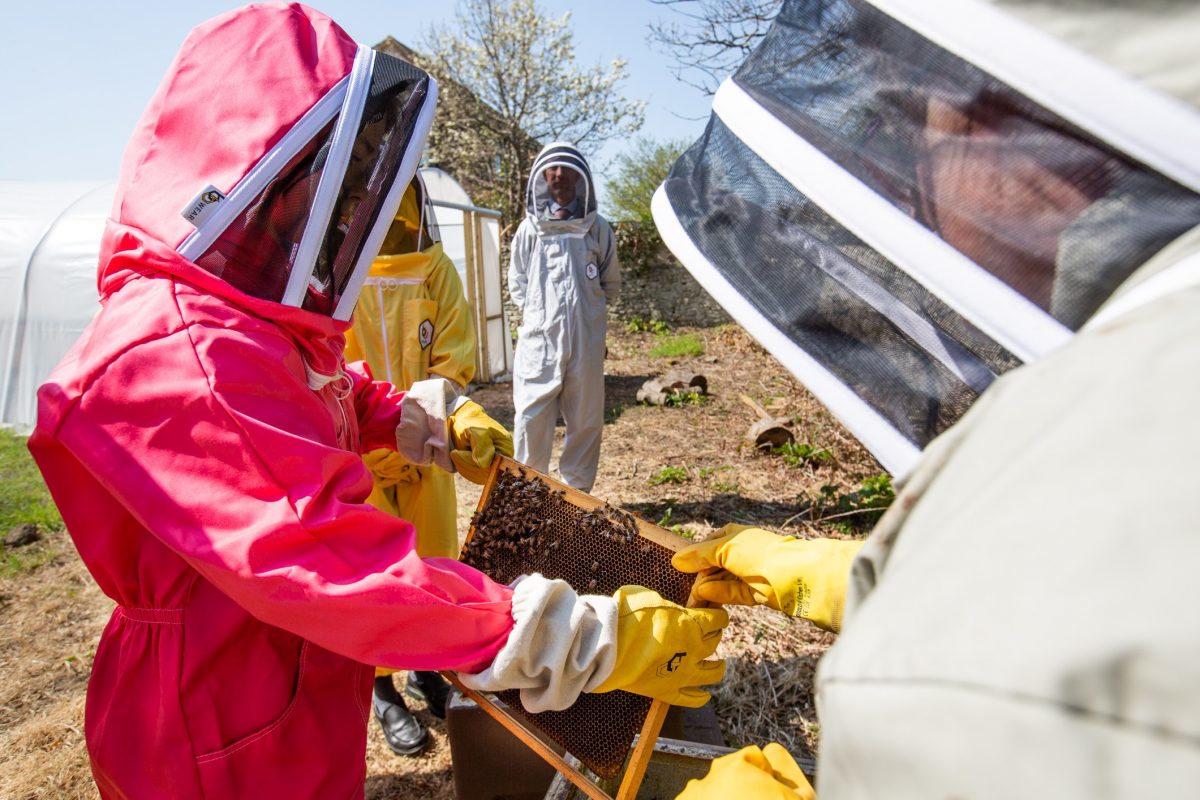Ryde School is a hive of activity
Posted: 14 March 2022

Overview
Ryde School with Upper Chine on the Isle of Wight have been working hard to embrace sustainability and have recently welcomed thousands of new additions to the School – honey bees!
As part of a collaboration with local Isle of Wight company, Bunbury Bees, the School now has an apiary comprising four hives. Located in the wildflower rich gardens of Millfield, one of our boarding houses, the specially chosen site for the apiary is the perfect habitat for the bees to thrive and for safe access for students and staff.
Planning
Our collaborators, Bunbury Bees, are professional small-scale commercial beekeepers who have supplied us with artificial hives in the “national” template, populated with honey bees from their own husbandry selected with mild temper as the primary attribute, opposed to their main husbandry program in which we select for temperament as just one of a range of desirable attributes.
A year before the hives were installed we invited Bunbury Bees to visit the school and survey the entire school site to assess suitably for hosting hives. Thankfully an ideal site was located – this was accessible for both people and vehicles but was not near a main thoroughfare and only had one access point so there was no through traffic. The site was also situated a distance away from the main teaching site and playing fields so the apiary could only be visited with intent rather than by accident. Once the viability of the site had been established we set a date to move the bees across (early Spring) and became school members of the British Beekeepers Association as well as members of the local Beekeepers Association – these allowed us access to really useful information including advice and proformas for writing a thorough and detailed risk assessment – this document included things like bee stings, anaphylaxis, aggressive bees, swarming, lack of beekeeping experience, risk of vandalism to the apiary, risk of fire and lifting heavy boxes!
By collaborating with professional beekeepers, teachers have access to expert knowledge – importantly our beekeepers are local rather than being national – this means we can call on them at almost any time and they will respond immediately. Teachers are briefed before taking a group with the beekeepers.
Our professional beekeepers supplied the majority of hardware including the hives, smokers and specific tools. We have supplied safety equipment including bee suits and gauntlets.
Details
Students Years 7-9 have the chance to experience beekeeping under the expert guidance of a professional beekeeper. Each student puts on a beekeeping outfit and then heads to the apiaries to examine the new residents while being guided by the experienced hand of Chris Van Wyk, Old Rydeian and owner of Bunbury Bees, a local professional beekeeping company with aparies across the Island.
These first sessions aim to introduce the art of beekeeping before we launch the project as a whole school CAS (Creativity, Action and Service) activity in September as part of our schools’ Round Square IDEALS programme. We hope eventually to add adult activities into the mix, involving the local community and parents who want to learn more about bees and the environment.
Inspections take the form of our regular weekly inspections, looking to confirm the health of the queen, the succession of brood and adequate quantity of stored nectar/honey and pollen. All this explained and demonstrated to the students, while also being opportunistic about other teachable moments as they arise from the organic progress of the hives, for example handling artificial swarming and introducing replacement queens when required. Our beeclub happens weekly throughout the year. In the winter months when inspections are less frequent the students are busy learning more about the theory of beekeeping as well as undertaking practical activities like building new frames for the beehives and making candles from the wax at Christmas.
Our primary concern is the safety of students and staff, so they are not to enter the bounds of the apiary site without full protective equipment and under our direction. Second but still highly prioritised is bee welfare, and so our three week cycle has included ongoing induction for students in the proper handling of the bees, typically aiming to have them all confident in safely handling frames of bees lifted from the hive by us and handed to them in week two, and performing the lift themselves themselves in week three. All this done under direct and close supervision of one or the other of us. Students are expected to be quiet, calm and respectful at all times – this is of massive importance.
Embracing sustainability is at the forefront of the School’s ethos and as a Round Square school, environmentalism is woven into our curriculum. There are also several after school clubs in environmental issues, and the Young Enterprise group have made sustainability the core part of their project. The School also sources as much as possible of their produce locally. As well as using Wight Milk, Farmhouse Fayre for fruit and veg, and locally reared lamb and beef, soon there will be another local product to add to the list – Ryde School Honey! A wonderful by-product of the bee project will be School honey, and eventually candles.
Challenges
As the summer progressed, children overheating in bee suits had to be addressed. We were also extremely fortunate with the weather, with breaks occurring just in time for scheduled lessons. Beekeeping in general has to conform to the vagaries of the weather and is not easily put to a rigid schedule, but the provision of gazebos did save us in the most extreme heat.
We didn’t initially consider the various heights of participating students. Typically hives are elevated on a stand to a height comfortable for the bee keeper to work. Fortunately our early introductory meetings with the students highlighted this before it became a practical problem and we made provision for some lower stands for the smallest age groups and brought a small stool for the shortest students to stand on as they worked the hive.
It’s been intriguing to us the gaps in knowledge that students had about the general lifecycle and role in a broader ecosystem bees play. We quickly learned that the first of our three sessions with each group needed to be very broad based to bring everyone up to the same speed. At the same time, certain cultural references were raised by every group, and we found it amusing that every group from each age range had to have it explained that The Bee Movie was not an authoritative source of apicultural knowledge.
Perhaps the final, most important, and most rewarding challenge was overcoming the fear held by many of the students. We looked to take a nurturing approach, making sure to frame fear as caution and looking to moderate excess caution with increased knowledge. We had some remarkable successes. We were both very proud of bringing very nervous children to a point where they felt able to lift a frame covered with two thousand bees. While my secret hope is that perhaps among the children we’ve seen this term there might be one who is inspired to go on to invent a cure for some of the worst bee diseases 20 years down the road, I think the more immediate and realistic benefit is what further success in other areas might stand on that process of overcoming a fear.
Impact
Apart from the obvious academic links with biology and environmental science like studying mini beasts, pollination and sustainability, the bee project also aims to develop core skills and character, helping our students become even more compassionate, reflective and self-disciplined.
Students are now far more aware of not just bees but the connection between the environment and humans, the influence of bees on our culture and a practical understanding of the importance of this relationship – this has been the biggest impact – beekeeping has made this connection real and practised rather than simply theoretical or something seen on TV. Students have got to be calm and mindful around the bees – this needs practice and the students who have been involved with the bees remember the experience of being calm and mindful – this can be referenced in other situations and scenarios when students need to be reminded about the importance of being calm and mindful. Being part of the bee club has also involved students thinking more about important civic virtues such as respect and service, not just when with the bees but also at events associated with beekeeping in the community.
Advice
We’ve found it to be a topic that children are very naturally inquisitive about, and I think the format of getting straight into a bee suit after covering safety and skipping the sort of theoretical teaching that an adult group would typically start with has been conducive to nurturing this inquisitiveness. We’ve found the questions to be quite remarkably incisive and challenging, and we’ve made it our policy to praise good questions at every opportunity, particularly once we’ve not been able to answer immediately. When this has occurred we’ve made sure to make a point of coming back then next week with an answer after researching it and I think this has been exceptionally encouraging to the children concerned.
Apiculture is a field where it also particularly easy to be overly pedantic about terminology, with very specific meanings to words often used more broadly by the general public, and I think to not soften the usual mode of beekeepers to be sticklers for correct use of terms in these first moments of contact with apiculture could very easily extinguish all enthusiasm a child would otherwise have.
